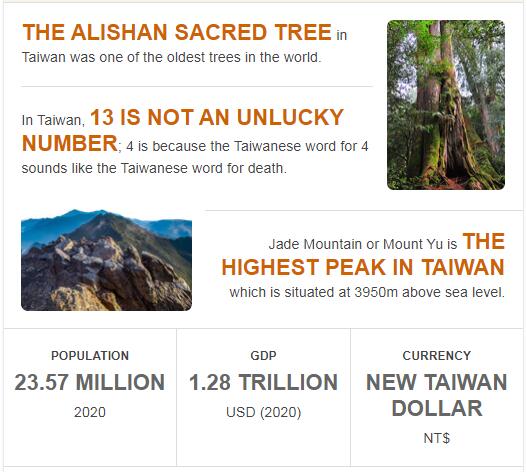Taiwan had a population of 23.8 million people in 2017. The economy was highly prosperous, with GDP per capita among the highest in Asia and a well-educated workforce. Foreign relations were strained with mainland China due to their ongoing political differences, though Taiwan maintained diplomatic relations with many other countries. Taiwan is a representative democracy governed under a multi-party system, with the president holding executive power and the Legislative Yuan exercising legislative power. In 2017, Tsai Ing-wen was re-elected as president of Taiwan with 57% of the vote in an election that was widely considered to be free and fair. See militarynous for Taiwan military and defense.
Yearbook 2017
Taiwan. According to Countryaah.com, Taiwan-Mainland China relations became increasingly cold after Tsai Ing-wen took office as president in 2016. Tsai refused to publicly endorse the agreement between her representatives as president, Ma Ying-jeou, and Beijing, stating that there is only “one China”. Admittedly, this had been interpreted in different ways in both countries, but Tsai’s attitude aroused despite the discontent of mainland China. Since the summer of 2016, the Beijing regime had severed official contacts with Taibei and countered Taiwan’s participation in international contexts. As a result, for the first time in eight years, Taiwan was not allowed to participate as an observer at the World Health Organization’s (WHO) annual meeting in May. The month after, Panama severed its diplomatic contacts with Taiwan and instead began diplomatic relations with China. See ABBREVIATIONFINDER for frequently used acronyms and abbreviations related to as well as country profile of Taiwan.
In September, President Tsai announced that Lai Ching-te, mayor of the city of Tainan, would replace Lin Chuan as the country’s prime minister. The government was otherwise left unchanged on the most important items. In November, democracy activist Lee Ming-che was sentenced to five years in prison by a court in China. Lee disappeared in March during a trip to China. Some time later the message came that he had been arrested and suspected of overthrowing activities. Lee had used social media to propagate democracy and multi-party systems in China. President Tsai criticized the verdict and demanded Lee’s immediate release.
In December, Parliament passed a law to help the country settle the human rights violations committed during Chiang Kai-shek’s tenure in power 1947-75.
In late 2000, for the first time, Taipei allowed trade contacts between the islands of Qinmen and Matsu close to China’s coast and mainland. Although the islands are close to major cities such as Xianmen, trade relations to date have been indirect, and had gone via Hong Kong and Macau. After more than 50 years of separation, Taiwan and China celebrated the first direct relations between the two countries at the beginning of 2001. Beijing preferred a wider opening in relation to Taiwan to allow connections to all points on the island from all points on the mainland. The transport of goods between the two countries has traditionally been via Hong Kong. It is an obstacle to the continued growth of trade between the two countries.
2001 was a difficult year for the Taiwanese economy. Both exports and imports fell as a result of the world economic crisis. Unemployment rose to 5%, mainly due to the decline in exports of high-tech goods to the United States. The same year, Taiwan was admitted as the 144th member of the WTO.
At the December 2001 parliamentary elections, KMT lost the majority – for the first time since 1949. KMT was unable to withstand the process of democratization initiated by the party’s own leaders.
The Dalai Lama’s visit to Taiwan in March 2002 provoked China, who regarded Tibet’s spiritual leader as a messenger of independence policy. The spokesman for the Taiwanese government, Su Cheng-Ping, stated that the visit of the Dalai Lama – the second – was merely aimed at enhancing the spiritual spirit of the community and supporting traditional Tibetan culture.
In January 2002, President Chen transformed his government in the economic sphere, and for the first time went the post of finance minister to a woman: 53-year-old Christine Tsung. Her job is to save the country from the economic downturn, thus paving the way for reelection of the president in 2004.
On March 30, 2002, an earthquake struck Taiwan and caused several buildings to collapse in Taipei, where people fled in panic into the streets. The quake was measured at 6.8 on the Richter scale, and its epicenter was in Hualien, 180 km east of the capital. At least 10 people were killed and about 200 injured.
In May 2003, there was a sharp increase in the number of pneumonia that had symptoms closely related to SARS. The first SARS case was detected in Guangdong Province, China in November 2002. Only in July did WHO remove Taiwan – as the last country – from the list of countries affected by the SARS virus.
